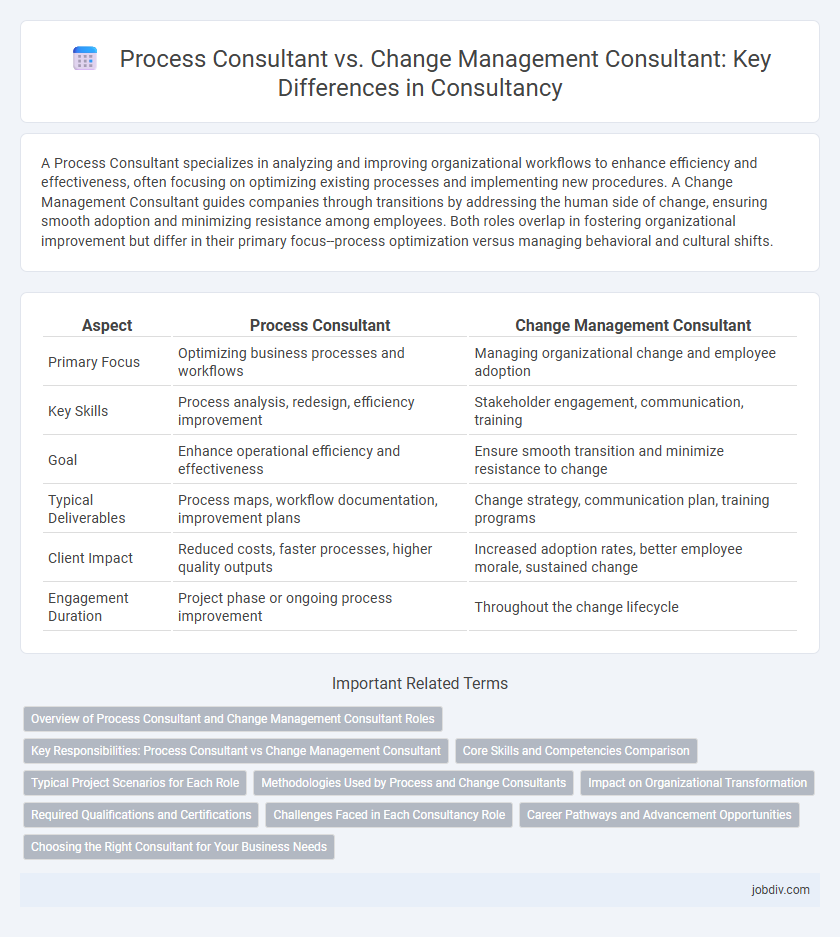A Process Consultant specializes in analyzing and improving organizational workflows to enhance efficiency and effectiveness, often focusing on optimizing existing processes and implementing new procedures. A Change Management Consultant guides companies through transitions by addressing the human side of change, ensuring smooth adoption and minimizing resistance among employees. Both roles overlap in fostering organizational improvement but differ in their primary focus--process optimization versus managing behavioral and cultural shifts.
Table of Comparison
| Aspect | Process Consultant | Change Management Consultant |
|---|---|---|
| Primary Focus | Optimizing business processes and workflows | Managing organizational change and employee adoption |
| Key Skills | Process analysis, redesign, efficiency improvement | Stakeholder engagement, communication, training |
| Goal | Enhance operational efficiency and effectiveness | Ensure smooth transition and minimize resistance to change |
| Typical Deliverables | Process maps, workflow documentation, improvement plans | Change strategy, communication plan, training programs |
| Client Impact | Reduced costs, faster processes, higher quality outputs | Increased adoption rates, better employee morale, sustained change |
| Engagement Duration | Project phase or ongoing process improvement | Throughout the change lifecycle |
Overview of Process Consultant and Change Management Consultant Roles
Process Consultants analyze and improve organizational workflows to enhance efficiency, focusing on optimizing business processes through mapping, redesign, and implementation of best practices. Change Management Consultants specialize in guiding organizations through transitions by developing strategies to manage employee adoption, minimize resistance, and ensure successful implementation of change initiatives. Both roles require strong communication and analytical skills but differ in primary focus: Process Consultants target operational improvements, while Change Management Consultants concentrate on managing the human and cultural aspects of change.
Key Responsibilities: Process Consultant vs Change Management Consultant
Process Consultants specialize in analyzing, designing, and optimizing business workflows to enhance efficiency, reduce costs, and improve quality, focusing primarily on operational improvements and process reengineering. Change Management Consultants concentrate on managing organizational change by developing communication strategies, stakeholder engagement plans, and training programs to ensure smooth transitions and employee adoption of new initiatives. Both roles require collaboration with leadership but differ as Process Consultants focus on technical workflow improvements, whereas Change Management Consultants emphasize human factors and cultural adaptation.
Core Skills and Competencies Comparison
Process consultants excel in analyzing and optimizing operational workflows using expertise in Six Sigma, Lean methodologies, and process mapping to enhance efficiency and reduce costs. Change management consultants specialize in stakeholder engagement, communication strategies, and behavioral change frameworks like ADKAR to facilitate organizational transitions and minimize resistance. Both roles demand strong analytical skills, project management capabilities, and proficiency in data-driven decision-making to deliver sustainable business improvements.
Typical Project Scenarios for Each Role
Process Consultants specialize in optimizing operational workflows and designing efficient systems in projects such as business process reengineering, process automation, and quality improvement initiatives. Change Management Consultants focus on guiding organizations through transitions involving cultural shifts, technology adoption, and stakeholder engagement in scenarios like mergers, digital transformation, and organizational restructuring. Projects involving cross-functional collaboration often require Process Consultants to streamline tasks, while Change Management Consultants drive employee adoption and manage resistance to change.
Methodologies Used by Process and Change Consultants
Process consultants primarily utilize methodologies such as Lean, Six Sigma, and BPMN to analyze, optimize, and standardize organizational workflows for improved efficiency and quality. Change management consultants rely on frameworks like ADKAR, Kotter's 8-Step Process, and Prosci to guide organizations through the human and cultural aspects of transformation, ensuring stakeholder engagement and adoption. Both roles integrate data-driven tools and stakeholder analysis but differentiate by focusing respectively on operational processes versus behavioral and organizational change.
Impact on Organizational Transformation
Process Consultants streamline workflows by analyzing and redesigning operational procedures to boost efficiency and reduce costs, directly impacting organizational transformation through improved process performance. Change Management Consultants guide employees and leadership through transitions by addressing resistance and fostering adoption of new initiatives, ensuring sustainable behavioral and cultural shifts. Both roles collaboratively drive successful organizational transformation by aligning process improvements with change adoption strategies.
Required Qualifications and Certifications
Process Consultants typically require certifications in Lean Six Sigma, PMP, or Business Process Management (BPM) to demonstrate expertise in optimizing workflows and operational efficiency. Change Management Consultants often hold certifications such as Prosci Change Management, ACMP Certified Change Management Professional (CCMP), or Agile certifications to effectively guide organizational transitions and employee adoption strategies. Both roles benefit from strong analytical skills, stakeholder communication abilities, and relevant industry experience to drive successful business transformations.
Challenges Faced in Each Consultancy Role
Process Consultants often face challenges in accurately mapping complex workflows and overcoming resistance from employees reluctant to alter established procedures. Change Management Consultants struggle with aligning diverse stakeholder interests and maintaining sustained engagement throughout the organizational transformation process. Both roles demand strong communication skills and adaptability to address evolving business needs and cultural dynamics.
Career Pathways and Advancement Opportunities
Process Consultants specialize in optimizing organizational workflows and can advance into roles such as Business Process Manager or Operations Director, leveraging expertise in efficiency and automation tools. Change Management Consultants focus on guiding transitions, risk mitigation, and stakeholder engagement, progressing towards positions like Change Director or Organizational Development Leader. Both career paths offer growth through certifications like Lean Six Sigma for Process Consultants and Prosci or ACMP credentials for Change Management Consultants.
Choosing the Right Consultant for Your Business Needs
Selecting the right consultant between a Process Consultant and a Change Management Consultant depends on your business's specific goals and challenges. Process Consultants specialize in analyzing and optimizing operational workflows to improve efficiency and reduce costs, while Change Management Consultants focus on guiding organizations through transformation by addressing employee adoption, communication strategies, and resistance management. Aligning your choice with your primary objective--whether it's enhancing process performance or managing organizational change--ensures the most effective results for your business.
Process Consultant vs Change Management Consultant Infographic

 jobdiv.com
jobdiv.com